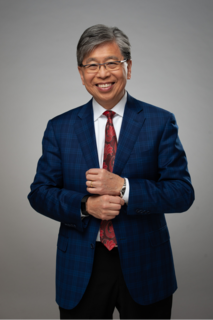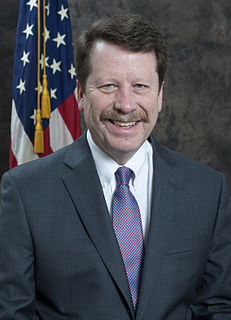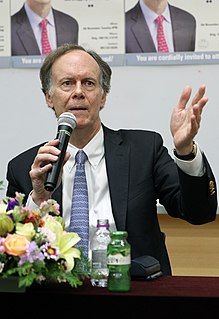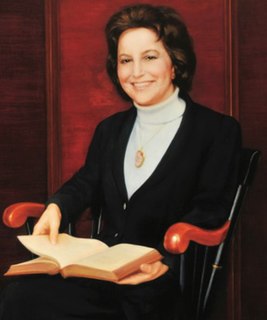Related Research Articles

The University of California, San Francisco (UCSF) is a public land-grant research university in San Francisco, California. It is part of the University of California system and it is dedicated entirely to health science. It is a major center of medical and biological research and teaching.
Stanford University School of Medicine is the medical school of Stanford University and is located in Stanford, California. It traces its roots to the Medical Department of the University of the Pacific, founded in San Francisco in 1858. This medical institution, then called Cooper Medical College, was acquired by Stanford in 1908. The medical school moved to the Stanford campus near Palo Alto, California, in 1959.

The President's Council of Advisors on Science and Technology (PCAST) is a council, chartered in each administration with a broad mandate to advise the President of the United States on science and technology. The current PCAST was established by Executive Order 13226 on September 30, 2001, by President George W. Bush, was re-chartered by President Obama's April 21, 2010, Executive Order 13539, and was most recently re-chartered by President Trump's October 22, 2019, Executive Order 13895.
Daniel Willett Foster, M.D., M.A.C.P. was the John Denis McGarry, Ph.D. Distinguished Chair in Diabetes and Metabolic Research and Professor of Internal Medicine at the University of Texas Southwestern Medical School at Dallas. He was Chairman of the Department of Internal Medicine for 16 years. He was a Fellow of the American Academy of Arts and Sciences, a Fellow of the American Association for the Advancement of Science and a member of the Institute of Medicine of the National Academies. He was a Master of the American College of Physicians. He was also a former member of the President's Council on Bioethics.
Thomas Dean Pollard is a prominent educator, cell biologist and biophysicist whose research focuses on understanding cell motility through the study of actin filaments and myosin motors. He is Sterling Professor of Molecular, Cellular & Developmental Biology and a Professor of Cell Biology and Molecular Biophysics & Biochemistry at Yale University. He was Dean of Yale's Graduate School of Arts and Sciences from 2010 to 2014, and President of the Salk Institute for Biological Studies from 1996 to 2001.

Edison T. Liu, M.D. is the former president and CEO of The Jackson Laboratory, and the former director of its NCI-designated Cancer Center (2012-2021). As CEO of The Jackson Laboratory, the organization doubled revenue, faculty and personnel, expanded globally from two campuses to six, established 13 endowed chairs, and increased the institutional endowment by five-fold. He is currently a Professor and Honorary Fellow at the institution. Before joining The Jackson Laboratory, he was the founding executive director of the Genome Institute of Singapore (GIS), chairman of the board of the Health Sciences Authority, and president of the Human Genome Organization (HUGO) (2007-2013). As the executive director of the GIS, he brought the institution to international prominence as one of the most productive genomics institutions in the world.

George Quentin Daley is the Dean of the Faculty of Medicine, Caroline Shields Walker Professor of Medicine, and Professor of Biological Chemistry and Molecular Pharmacology at Harvard Medical School. He was formerly the Robert A. Stranahan Professor of Pediatrics at Harvard Medical School, Director of the Stem Cell Transplantation Program at Boston Children's Hospital, and an investigator of the Howard Hughes Medical Institute, Associate Director of Children’s Stem Cell Program, a member of the Executive Committee of the Harvard Stem Cell Institute. He is a past president of the International Society for Stem Cell Research (2007–2008).
Dr. Manuel Martínez Maldonado, MD; MACP, an internist and nephrologist, administrator, educator, poet and author, has authored numerous scientific publications and edited several books. His research interests are the regulation of body fluids and the pathophysiology of blood pressure and its effects on the kidneys. He also focuses on the renin angiotensin system, a hormone system that helps regulate long-term blood pressure and blood volume in the body and which is controlled primarily by the kidneys. His clinical research has included polycycstic kidney disease, renal stones and hypercalcemia. Martinez-Maldonado has occupied numerous positions, including Vice President for Research at Oregon Health and Sciences University (1998-2000), President and Dean of the Ponce School of Medicine (2000–2006). He was the executive vice president for research at the University of Louisville from 2000–2009.
Blake Shaw Wilson is an American research scientist best known for his role in developing signal processing strategies for the cochlear implant.

Walter J. “Wally” Koch is an American scientist best known for his work with G protein-coupled receptors in the heart and gene therapy approaches to cardiovascular disease. He is currently a Principal Investigator at Temple University School of Medicine, where he is also the Director of the Center for Translational Medicine, Professor and Chairman of the Department of Pharmacology, and W.W. Smith Chair in Cardiovascular Medicine. In 2013, he co-founded the biotech company, Renovacor.

Robert McKinnon Califf is an American cardiologist who currently serves as the commissioner of the Food and Drug Administration. He was nominated to be commissioner in September 2015 by President Barack Obama and he was confirmed by the U.S. Senate in February 2016, serving until January 20, 2017.
Barry R. Bloom is Harvard University Distinguished Service Professor and Joan L. and Julius H. Jacobson Professor of Public Health in the Department of Immunology and Infectious Diseases and Department of Global Health and Population in the Harvard T.H. Chan School of Public Health in Boston, where he served as dean of the faculty from 1998 through December 31, 2008.

William G. Kaelin Jr. is an American Nobel Laureate physician-scientist. He is a professor of medicine at Harvard University and the Dana-Farber Cancer Institute. His laboratory studies tumor suppressor proteins. In 2016, Kaelin received the Albert Lasker Award for Basic Medical Research and the AACR Princess Takamatsu Award. He also won the Nobel Prize in Physiology or Medicine in 2019 along with Peter J. Ratcliffe and Gregg L. Semenza.

Lee Goldman is an American cardiologist and educator at Columbia University, where he is professor of medicine at the Vagelos College of Physicians and Surgeons, professor of epidemiology at the Mailman School of Public Health, and Dean Emeritus of the Faculties of Health Sciences and Medicine. From 2006 to 2020 he served as Executive Vice President and Dean of the Faculties of Health Sciences and Medicine, Chief Executive Officer of the Columbia University Irving Medical Center, and Harold and Margaret Hatch Professor of the university. Before moving to Columbia, he was chair of the department of medicine at the University of California, San Francisco. He received his B.A., M.D., and M.P.H. degrees from Yale University.
Harry Shamoon is Professor Emeritus of endocrinology, diabetes and metabolism at the Albert Einstein College of Medicine and Montefiore Medical Center.

Leah Miriam Lowenstein was an American nephrologist, academic administrator, and cellist. In 1982, she became the first woman dean of a co-educational, medical school in the United States upon her appointment at Jefferson Medical College. Lowenstein was previously associate dean and professor of medicine and biochemistry at the Boston University School of Medicine. She served in the Carter administration as a medical advisor to the Assistant Secretary for Health. Lowenstein was an advocate for women in medicine.

Sherilynn Black is an American neuroscientist, the Associate Vice Provost for Faculty Advancement, as well as an Assistant Professor of the Practice of Medical Education at Duke University in Durham, North Carolina. Black’s research focuses on social neuroscience and developing interventions to promote diversity in academia. Black has been widely recognized for her commitment to faculty development and advancement and holds national appointments with the National Academy of Sciences, Engineering and Medicine, the National Institutes of Health, the Howard Hughes Medical Institute, the American Association of Medical Colleges, The Burroughs Wellcome Fund, and the Society for Neuroscience.
Donald "Don" Emil Ganem is an American physician, virologist, professor emeritus of microbiology and medicine, and former global head of infectious disease research at Novartis Institutes for BioMedical Research (NIBR).
Paul Anthony Insel is an American physician and pharmacologist. He has been the chief editor of four academic journals and is an elected fellow of the American Association for the Advancement of Science, American Society for Pharmacology and Experimental Therapeutics, and American Physiological Society. His research is primarily focused on G proteins.
Ophir David Klein is an American developmental biologist who specializes in pediatric medical genetics. Klein is a professor of Orofacial Sciences and Pediatrics at UCSF and director of the Institute for Human Genetics.
References
- 1 2 3 Williams spins science into fundraising gold, San Francisco Business Times
- ↑ American Society for Clinical Investigation Membership Directory
- ↑ Institute of Medicine Member Directory
- ↑ American Association for the Advancement of Science Member Directory
- ↑ http://phx.corporate-ir.net/phoenix.zhtml?c=84636&p=irol-govBoard LabCorp Board of Directors
- ↑ "R. Sanders Williams Named Senior Advisor for International Strategy".